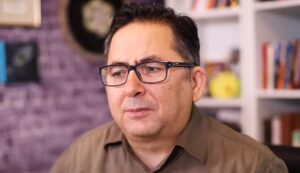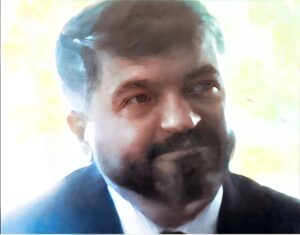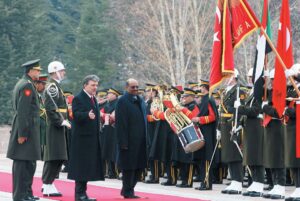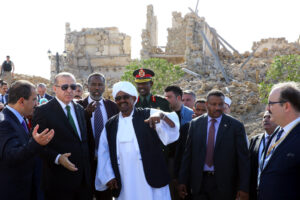Abdullah Bozkurt/Stockholm
The Turkish intelligence agency (Milli İstihbarat Teşkilatı, MIT) secretly transported an undisclosed amount of cash on privately leased planes to Sudan to provide financial support to then-Sudanese president Omar al-Bashir, who had been indicted for genocide and war crimes in Darfur.
The clandestine operation was overseen by Kemal Eskintan, who was in charge of the special operations department within the agency. A former soldier, Eskintan had played a prominent role in Turkey’s covert efforts to support armed jihadist groups in the Middle East and Africa, aligning with the political goals of the government of Turkish President Recep Tayyip Erdogan. He had personally delivered suitcases filled with cash to the Sudanese president on multiple occasions.
The revelation came from Adem Yavuz Arslan, a Turkish investigative journalist based in the United States. Arslan disclosed that he had interviewed a well-placed inside source who was personally acquainted with Eskintan and possessed intimate knowledge of the secret operation. Arslan told Nordic Monitor that this operation took place during the years 2013 and 2014.
It is no secret that President Erdogan cultivated close ties with al-Bashir and consistently defended the Sudanese president’s track record, despite serious and credible allegations of widespread human rights violations. Erdogan hosted al-Bashir in Turkey on several occasions, even when the Sudanese leader faced international criticism for mass killings and when he was under indictment by the International Criminal Court (ICC) prosecutor for war crimes in Darfur.
However, the covert funneling of cash to support the al-Bashir regime had never been disclosed publicly before. This revelation sheds light on the extent to which Erdogan was willing to go in order to assist his Islamist ally in Africa and to prop up rogue regimes that had become international pariahs due to their egregious human rights violations.

In March 2006, during an official visit to Sudan, Erdogan visited Darfur to express his support for al-Bashir. During this visit, he made the statement, “I do not believe that there has been assimilation or a genocide in Darfur,” effectively defending the al-Bashir regime. This stance was in stark contrast to the credible reports of massive human rights violations documented by the United Nations and various nongovernmental organizations. At that time the United States had officially characterized the killings of hundreds of thousands in Darfur as genocide.
In January 2008 al-Bashir reciprocated Erdogan’s trip to Sudan by making a state visit to Turkey. This took place at the invitation of Erdogan, who was serving as prime minister at the time. During his visit al-Bashir continued to deny charges of genocide and war crimes, despite the international allegations and criticism surrounding his regime’s actions in Darfur.
Following his indictment on July 14, 2008 by the International Criminal Court (ICC) for genocide and war crimes in Darfur, al-Bashir announced his intention to attend a summit of African leaders in Turkey in August of the same year. This decision marked his first trip abroad since the ICC had moved to indict him for genocide. His decision to attend the summit was seen as a bold act of defiance in the face of the international criminal court’s indictment of him.
Turkey, which had not ratified the treaty establishing the ICC, made it explicitly clear that it would not take any action against the Sudanese president during his visit. Furthermore, Turkey emphasized that even if an arrest warrant were to be issued during al-Bashir’s visit, it had no obligation to take the Sudanese head of state into custody because it was not a member of the ICC, which is based in The Hague.

Indeed, the situation worked to the benefit of al-Bashir. During the Africa summit in Istanbul, he used the platform as an opportunity to vehemently deny the charges brought against him by prosecutors, who alleged that militias supported by his government had been responsible for the deaths of approximately 300,000 Africans since 2003. The Sudanese president contended that the death toll had been exaggerated and boldly asserted at a press conference that “genocide, as the ICC claims, is nonexistent.” He further challenged the accuracy of the figures, posing the question, “If [those figures were] accurate, there needs to be mass graves. Where are those graves?”
Al-Bashir also expressed the belief that there was substantial support for him from Turkey, saying, “The Turkish government is an esteemed one. We have deep historic ties. We don’t have any concerns about our relationship with Turkey. We intend to enhance our cooperation in the days ahead.”
In November 2009, following the ICC’s issuance of an arrest warrant in March, which had been requested by the prosecutor based on the indictment filed a year earlier, the Sudanese president planned to attend an economic summit during the Organisation of Islamic Cooperation (OIC) 25th session of the Standing Committee for Economic and Commercial Cooperation (COMCEC) in Turkey. Prior to al-Bashir’s expected visit, Erdogan once again defended him during a TV interview. Erdogan reiterated his stance, stating that he did not believe that there had been assimilation or genocide in Darfur.
Turkey was prepared to host al-Bashir for the third time, but the Sudanese president cancelled his visit at the last minute. He cited domestic issues that required his attention as the reason for the cancellation. There were allegations that Ankara had conveyed a private message to Khartoum suggesting that al-Bashir’s visit might create problems due to the growing international reactions over the potential visit. However, both Turkish and Sudanese officials denied this claim.

Indeed, until al-Bashir’s removal from power through a military coup in April 2019, Erdogan had consistently supported him. While Turkey’s network in Sudan had expanded during al-Bashir’s rule, it did experience setbacks following his removal. However, it continues to function to some degree. During the Erdogan government’s tenure, some Sudanese Islamist and jihadist figures found safe haven in Turkey, contributing to ongoing concerns and debates about Turkey’s stance on these issues.
Having invested a significant amount of political capital in al-Bashir, the Turkish president was undoubtedly frustrated to witness the ousting of his ally. During a speech at a ruling Justice and Development Party (AKP) convention on April 26, 2019, Erdogan expressed the view that Sudan was a crucial part of Africa and voiced concerns about the international interventions in the country. Despite these frustrations, he pledged to continue supporting his “brothers” in Sudan, signaling his ongoing commitment to maintaining ties and influence in the region.
Erdogan’s associates were swift to accuse Egypt, Saudi Arabia and the US of playing a role in the ousting of Sudan’s long-time ruler. They alleged that these regional and global players had a hand in the regime change. Erdogan and his Islamist allies had been supportive of the Muslim Brotherhood and various other Islamist factions abroad. They had entered into numerous bilateral agreements with the al-Bashir government, aiming to establish alliances that could counter regional rivals such as Egypt and the Gulf countries. These actions reflected their broader strategy of aligning with Islamist movements and governments in the Middle East and North Africa.

The issue of Suakin Island in Sudan, of which Turkey was granted use during Erdogan’s visit in December 2017, has remained a significant point of contention. While the specific details of the agreement were not made public, there were reports from Erdogan’s supporters suggesting the possibility of building a military base on the island. This idea generated concerns and objections, particularly from Egypt and Gulf countries, which questioned Turkey’s intentions in the region.
The Turkish Cooperation and Coordination Agency (TİKA) initiated restoration work on buildings in the port on Suakin Island, and there were plans in progress to modernize the port facilities. Erdogan even personally visited Suakin to inspect these facilities. The situation surrounding Suakin Island underscored the complex geopolitical dynamics in the region and Turkey’s efforts to extend its influence in the Red Sea area, which has been met with skepticism and opposition from some regional actors.
The network that developed between Turkey and Sudan has also been exploited by terrorist groups for their operations. According to United Nations investigators, the leader of the Islamic State in Iraq and Syria (ISIS) terrorist group in Sudan has been directing operations through Turkey. In a report submitted to the UN Security Council in July, investigators revealed that an individual named Abu Bakr Al-Iraqi, an Iraqi national with significant experience within ISIS, has been overseeing ISIS cells in Sudan and financing their operations through illicit means in Turkey. This raises concerns about the potential misuse of such networks for facilitating terrorist activities and underscores the need for international efforts to counter terrorism and its financing.
The report referenced intelligence from a UN member state indicating that Al-Iraqi had established multiple businesses under false identities in both Sudan and Turkey. He reportedly manages several money exchanges and a travel/tourism agency in Turkey while also maintaining significant investments within Sudan.
The ISIS network in Sudan comprises approximately 100 to 200 experienced fighters who primarily function as facilitators for logistical operations and transactions, as highlighted in the UN report.












